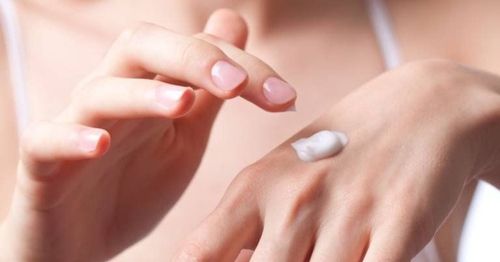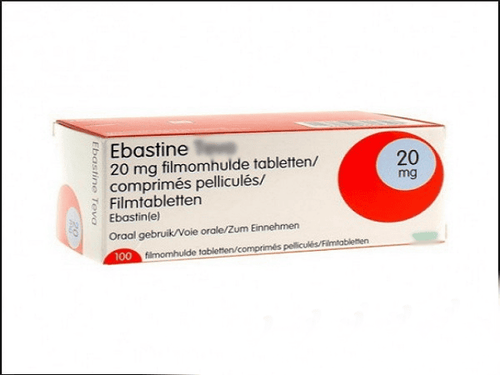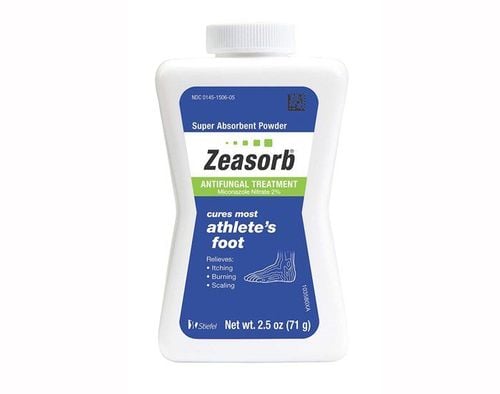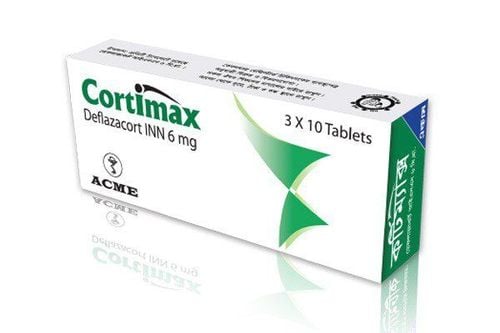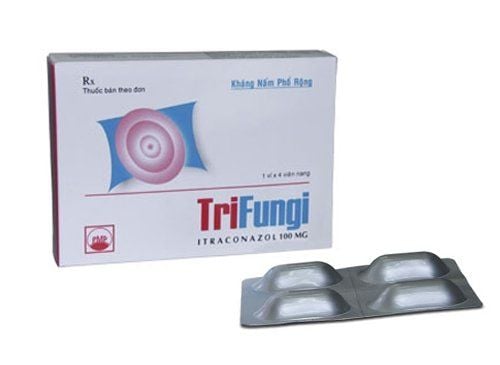This is an automatically translated article.
Triradi is a topical medication used in the treatment of dermatology. Drugs containing Betamethasone, Clotrimazole and Gentamicin are effective against both bacteria and fungi. So what is the mechanism of action of Triradi and how to use the drug to achieve the best effect and be safe for the patient?
1. What is Triradi?
Triradi is one of the drugs commonly used in the treatment of dermatological diseases. The main ingredients of the drug contain:
Betamethasone dipropionate 5.2mg. Clotrimazole 80mg. Gentamicin in the form of Gentamicin sulfate 8mg. Some basic information about the main ingredients of the drug:
Active ingredient Betamethasone:
Betamethasone is one of the synthetic derivatives of Prednisolone. This is a corticosteroid of the adrenal gland with strong anti-inflammatory ability thanks to the effect of reducing the body's resistance to pathogens, and also very good anti-allergic. It is used in the treatment of a variety of inflammatory diseases and with corticosteroid-responsive disorders. This active substance has high glucocorticoid activity. When used at high doses, Betamethasone has a relatively strong immunosuppressive effect.
Betamethasone is well absorbed from the gastrointestinal tract, when used topically, especially as a bandage or on damaged skin. In addition to topical, oral, Betamethasone is also used in the form of intravenous or intramuscular injection.
Betamethasone can cross the placental barrier and is excreted in breast milk. In the body, the drug is mainly metabolized in the liver, partly in the kidneys and then excreted in the urine.
Betamethasone is often indicated in the treatment of:
Hormonal disorders such as adrenal hyperplasia, thyroiditis, cancer-related hypercalcemia, adrenocortical insufficiency... Skeletal muscle disorders Joints: Psoriatic rheumatism, rheumatoid arthritis, bursitis, synovitis... Skin diseases such as allergies, herpes vesicular dermatitis, exfoliative dermatitis, psoriasis , urticaria... Treatment of some other allergic cases such as allergic rhinitis, atopic dermatitis, allergic reactions due to drugs. Support for the treatment of respiratory diseases such as Loeffler syndrome unresponsive to other treatments, Beryllium poisoning, combined with chemotherapy to treat pulmonary tuberculosis and pulmonary fibrosis... Blood: Hemolytic anemia with autoimmune factors, anemia due to hereditary hypoplasia, acute blood cancer in children, thrombocytopenia. In addition, the drug is also used to treat eye diseases, tuberculous meningitis with lower obstruction, ulcerative colitis... Ingredients Clotrimazol:
Clotrimazole is a synthetic derivative of Imidazole. This active substance has a chemical structure similar to Miconazole.
Effect of Clotrimazole:
Active ingredient with broad-spectrum antifungal effect, produced mainly in the form of a topical drug thanks to its ability to inhibit the growth of fungi. The drug works well on yeast, Malassezia furfur and Dermatophytes. The drug has bacteriostatic and fungicidal activity in vitro against isolates of Trichophyton, Candida albicans... In addition, the drug is also effective on some gram-positive bacteria, especially Staphylococcus. Mechanism of action of Clotrimazol: The drug interferes with the lipids of the fungal cell membrane to change the permeability of the membrane, thereby inhibiting the growth of the fungus. On the other hand, at low doses, the drug inhibits the synthesis of ergosterol in the cell wall, while at high doses, the drug causes direct damage to the cell membrane without the need for inhibition of ergosterol synthesis.
Some other views suggest that Clotrimazole also inhibits the synthesis of nuclear acids that cause lipid metabolism disorders and polysaccharides leading to damage to the cell membrane of fungi.
Clotrimazole is indicated for local treatment of diseases related to fungal skin such as tinea pedis, interstitial fungus, systemic fungal infections, tinea versicolor, inguinal fungus...
Gentamicin ingredients:
Gentamicin is an antibiotic aminoglycoside group.
The main effect of Gentamicin is to inhibit the protein biosynthesis of bacteria, thereby helping to destroy pathogenic bacteria. Gentamicin's bactericidal spectrum is relatively broad, with good activity against gram-negative aerobic bacteria, staphylococci and also penicillinase-related strains or methicillin-resistant cases.
Gentamicin is indicated for use in the following cases:
Treatment of respiratory tract infections, biliary tract infections, genital tract infections, skin infections, meningitis, endocarditis, peritonitis ... Treatment of Brucella infection or Listeria infection. Treatment of intraoperative infections.
2. What effects does Triradi have?
Triradi is the perfect combination of Betamethasone, Clotrimazole and Gentamicin. This combination brings broad-spectrum antibacterial and antifungal effects, good therapeutic effect on many different diseases.
Triradi is indicated in the following cases:
Treatment of corticosteroid-responsive dermatitis when secondary infectious complications are present. Treatment of allergic skin diseases such as dermatitis, abrasions, eczema or diaper rash in children. Treatment of fungal skin infections, vitiligo. Contraindications to use the drug with:
Patients with a history of allergy or hypersensitivity to any of the ingredients of the drug. Do not use the drug in patients with hypersensitivity to drugs other than aminoglycosides. Do not use the drug in open damaged skin areas such as scratches, sores... Eczema of the outer ear with perforated tympanic membrane should not be used.
3. Dosage and how to use Triradi
The drug is produced in the form of a topical cream, canned in a tube, 1 box has 1 tube containing 8 or 10g of the drug depending on the manufacturer.
Triradi medicine is produced in the form of topical application, so it should not be taken orally, injected or other drug routes.
Dosage of the drug: Apply a sufficient amount of cream to the affected skin area, gently massage to allow the cream to penetrate evenly. Use twice a day, morning and evening, maintain regularly for optimal results.
4. Side effects and notes when using Triradi
Some side effects may occur when taking Triradi:
The drug causes hypochromic red blood cells. When used on the skin, the drug can cause systemic allergy or local irritation, urticaria, erythema, heat, itching, some people have ichthyosis , exudation, burning sensation at the application site. If used on patients with pressure bandages, large areas will easily irritate the skin, dry skin, appear acne even though they did not previously, reduce pigmentation in the affected area, skin atrophy, positive skin lines, granules millet, folliculitis or hirsutism. To limit the risk of unwanted effects, when taking the drug, it is necessary to note the following:
Use the drug according to the instructions of the doctor, do not arbitrarily increase or decrease the dose of the drug without consulting the doctor. of a specialist doctor. Triradi is on the list of prescription drugs, do not arbitrarily use without indication. The drug is for topical use only, not for oral or injectable use. Some drugs and active ingredients can reduce the activity of Gentamicin contained in Triradi such as calcium, Heparin, Mg, Sulfafurazol, Sulfacetamide, expectorant Acetylcysteine, Chloramphenicol, antibiotics Clindamycin, Doxorubicin, Actinomycin. Therefore, it should be considered if the patient is taking these medications. Co-administration of Triradi with Aminoglycoside drugs will cause cross-allergies. The drug should not be applied on open lesions, should not be applied to large areas or areas that need compression. Use with caution in children and infants. Betamethasone in the drug can cross the placenta and pass into breast milk, so if you are pregnant or breastfeeding, consult your doctor before taking it. Do not stop taking the medicine suddenly, consult your doctor before stopping the medicine. During treatment with Triradi, if you see any unusual health-related signs in your body, you should contact your treating doctor immediately for advice on timely handling. If the drug overdose, monitor the body's abnormal symptoms to notify the doctor promptly. Manifestations of drug overdose are similar to side effects. Sometimes, because the dose is too high, it can cause hepatotoxicity. If you accidentally miss a dose, do not double the dose to make up for the missed dose. Note with Triradi that you should not skip more than 2 doses in a row because it will affect the treatment results. Store medications according to the manufacturer's instructions. Keep medicine out of reach of children. Currently, the abuse of topical drugs is happening relatively much in clinical practice, not only does not bring effective treatment but also affects the health of patients. Therefore, it is necessary to grasp and understand the basic information about drugs in order to use drugs correctly and for the right purposes. Please contact specialist doctors if you are having health problems that require treatment advice.




